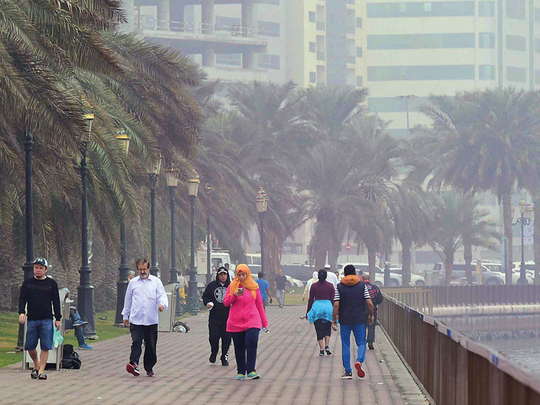
Dubai: Residents and motorists are advised to exercise caution as visibility will deteriorate again over the next two days due to thick fog.
“We expect tonight (Sunday night) to be the same as the previous days. Fog will start to form by early night after sunset at around 7.30pm to 8pm over some places and spread out by 10.30am or 11am on Monday. The same will happen on Tuesday,” a forecaster from the National Centre of Meteorology told Gulf News.
Gentle winds, increasing humidity, clear skies, and rapidly decreasing temperature cause this type of fog. It’s common during fall and winter when the land is cooling down overnight and, in turn, cools the air close to its surface. This air then becomes saturated with moisture, resulting in condensation and fog.
Visibility dropped to 50 metres at times over the Northern Emirates in Sharjah, Ras Al Khaimah, parts of Dubai and other coastal and internal areas. From Abu Dhabi city westwards, mist or slight fog was reported.
“We advise people that if it’s not necessary, don’t drive at night. When driving, keep safe distance between cars, especially when visibility is poor.”
The sea will be slight to moderate over the next two days.
How to avoid health issues in foggy weather with bad air quality
Residents with respiratory conditions should stay in dry places whenever possible as damp weather could trigger breathing problems, a doctor said.
People with respiratory conditions have very sensitive airways. Cold or damp air entering their airways can trigger asthma symptoms, such as coughing, wheezing, shortness of breath and tightness in the chest.
“Over the last two weeks, especially after the first week of December when it started getting cooler, we noted an increase in allergy-related issues such as allergic rhinitis, sneezing, nasal congestion, as well as wheezing,” Dr Sreekumar Sreedharan, Specialist, Internal Medicine at Aster Clinic, told Gulf News.
“For the last day, it’s become more humid and the temperature is on the lower side. We expect incidence of bronchial asthma to be on the higher side.”
Dr Sreedharan advised residents not to self-medicate, especially if their symptoms last for more than two days. People who have a history of allergies are advised to cover their heads, ears, or noses whenever outdoors.
They should also stay hydrated, he said, and reduce exposure to dusty or foggy environment, which can cause congestion.
Taking vitamin C to boost the immune system and ensuring airways are clear by staying away from pollutants are also helpful.
— J.P.D.L










